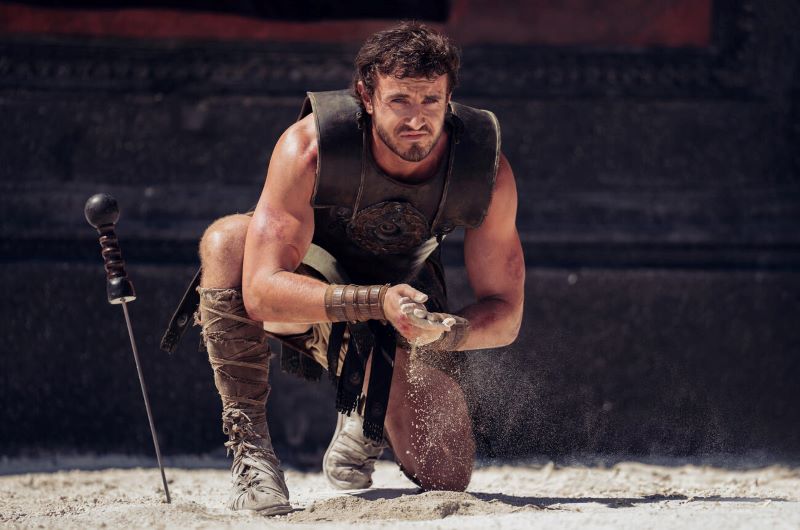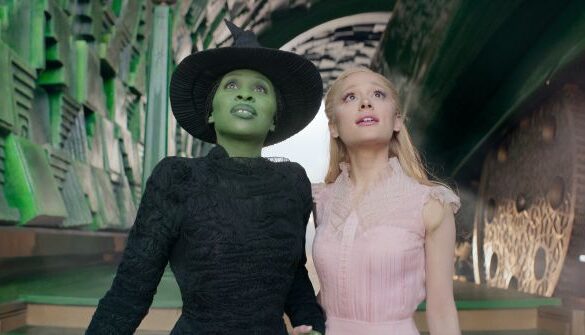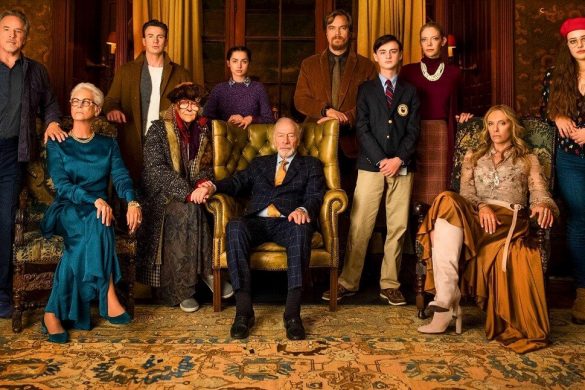When Ridley Scott’s “Gladiator” hit theaters 24 years ago, it was a sword and sandals epic that sentimentalized Coliseum games’ violence and the Roman Empire’s political drama through rousing performances, a powerful Hans Zimmer score and set pieces that transported the audience to a world where a gladiator changed the world. The film continues to stand the test of time. Now Scott is back with “Gladiator II,” a sequel that expands the mythology with a larger size and scope, impressive action set pieces, and solid performances from Denzel Washington and Paul Menscal. Unfortunately, even with all the glorious build-up and epic nostalgia, it leads to few rewards, if any.
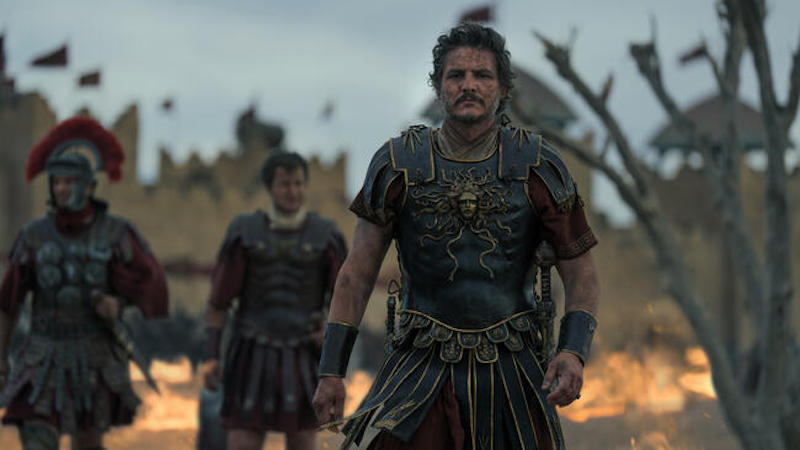
Pedro Pascal plays Marcus Acacius in Gladiator II from Paramount Pictures.
Set 16 years after the death of Maximus, the Roman Empire is on the verge of falling into ruin because of syphilis-ridden, power-hungry twins Geta (Joseph Quinn) and Caracalla (Fred Hechinger). With the dreams of a Roman Empire for the people crumbling and the empire expanding its reach through merciless invasion, the future is bleak. However, hope remains when a lost heir returns home in the most unexpected of ways.
Lucius (Paul Mescal), the son of Lucilla and Maximus, —lives with his Arishat (Yuval Gonen) peacefully on the Numidia coast, far away from the chaos festering in Rome. That peace is about to be broken, for a Roman invasion is on the horizon. As the people rally to defend their homeland, Lucius and Arishat solemnly vow to be together no matter the outcome. It’s clear that Lucius, who was brought here as a lonely orphan boy from the desert, godless and afraid, has embraced his new home and is willing to do anything to defend it. Based on the rousing speech about having nothing to fear and praying that their god is with them, if he is not, he is no god.
Cameras then turn their attention to the horizon and zero in on a tired General Marcus Acacius’s (Pedro Pascal) ship. The nearly 10-minute battle sequence sees soldiers going into battle, arrows being shot, swords swinging, and catapults launching. Its size and scope make everything we saw from its predecessor minute. However, the pivotal action set piece serves as a crucial motivator as Acacius kills Arishat. With Acacius successfully conquering Numidia, Lucius is forced to return to the home he has long forgotten.
The return home for Lucius and Acacius couldn’t be more diametrically opposed. Where one is welcomed home as a hero, the other is brought in as a slave. Geta and Caracalla want to celebrate their general’s conquest with games, which the hero deems unnecessary. Meanwhile, Lucius begins his path to glory through the arena, whose hallowed grounds are soaked in the blood of the warriors that came before him. But the gladiator isn’t interested in becoming a legend as much as he wants revenge. So he, along with his captured brethren, are forced to fight vicious apes; while some do not heed his strategies, Lucius unleashes his inner beast and savagely kills the opposing ape, surprising many. Such a victory gains Lucius the reputation of being ape-like, as noted by deafening howls by fellow gladiators.
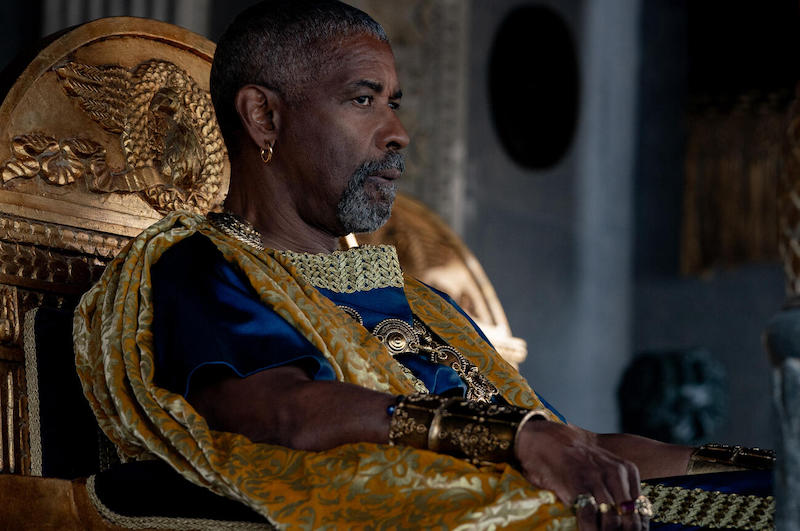
Denzel Washington plays Macrinus in Gladiator II from Paramount Pictures.
Macrinus (Denzel Washington), a former slave and now power broker who keeps a stable of gladiators, watched Lucius’s fight and now sees someone as an instrument to be used to help him reach the throne. “It is an art choosing Gladiators. Some choose entertainers. Some choose brute force. I choose rage,” Macrinus manpiulativally says. At first, Lucius refuses his offer to be mentored. Still, Macrinus says that if the gladiator would use his rage for him, he could bring Acacius to him in the arena.
While one has his plans to take over the Roman Empire, Acacius and Lucilla (Connie Nielsen) – unaware that her son has returned home – plan to overthrow it. Acacius can no longer sacrifice the lives of young men for the twin’s vanity and will only fight if it is to depose the two. So, on the final day of the game, he plans to use his own army to arrest the Emperors for their crimes against the Senate and their people. Though it is an ambitious plan of hope that died generations ago after Marcus Aurelius was murdered, it’s one that Lucilla believes in.
The story of a prodigal son seeking revenge is succinct. While the film’s marketing spoiled the surprise early on, it’s clear that Lucius wants retribution for what’s been taken from him. Deception and betrayal also play a role in the film as the characters are careful not to tip their hands to reveal their true intentions or identities to the other. While they are cautious with their words, their actions and emotions speak volumes. Although the performances and the physical demands work together, there needs to be more time to build an emotional connection to these characters so that we can connect with their struggles and, in some cases, their defeats or deaths.
That may be due to the fact that “Gladiator II” would rather be a continuation of events set a generation after its predecessor rather than be its own story. Typically, a sequel like this would be exciting to watch as it has plenty of story elements to justify the 24-year gap between films. Characters speak about how things were different generations ago and how heroes are merely ghosts of the past hidden away from the people so as not to remember how they have the power to rise against the government. But the fragmented plots are stitched together horribly, like sending an injured gladiator into battle immediately after getting hacked and slashed. Sometimes, David Scarpa’s script doubles down on what the original does while taking advantage of the bigger budget granted by a sequel.
Of course, betrayal and violence are part of the appeal of a film like this. Even Macrinus makes a note of that very early on. It’s not so much of the performative that doesn’t click, but how revelations are handled. Sure, Lucius, being the son of Maximus, was spoiled early on in the film’s marketing. Trailers gave way too much to spoil crucial plot twists, but because this is something that we’ve all seen before, there isn’t much reason to care about such a revelation. So the film works hard to unveil its plot twists with Macrinus investigating the disappearance of the lost heir, Lucilla mourning her sacrifice in secret, and Lucius dying his past and refusing to recognize his mother on multiple occasions, only to embrace it when he sees fit or when the film calls for it. So when that revelation is made, it doesn’t feel earned and feels more forced to get the story moving forward.
The difference between Maximus and Lucius is that Lucius isn’t interested in fixing Rome from the gladiator arena but rather seeks out his revenge. He befriends Ravi (Alexander Karim), a former gladiator who has put down his sword and become a doctor to save lives instead of taking them. The character’s sudden appearance helps humanize Lucius, and their banter helps bring some levity to a dry film.
Even if the film has a solid prodigal son story, the coup d’état and Macrinus’s political maneuvering subplot interfere. Though it isn’t clear where our attention should be, it doesn’t make any of it less fascinating. That’s because the cast’s performances help keep our interest. Mescal and Washington command our attention, with the latter looking like he is having a total blast playing as a power broker who is simply moving the pieces in place to win the political chess match. And Mescal’s Lucius has his eyes on the prize. Every word he speaks, every cut he takes, and every sword he swings is a reminder of what he is fighting for.
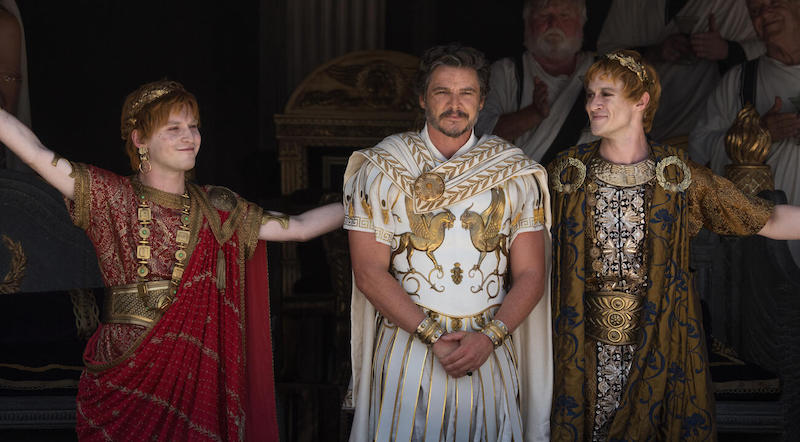
Fred Hechinger plays Emperor Caracalla, Pedro Pascal plays General Acacius and Joseph Quinn plays Emperor Geta in Gladiator II from Paramount Pictures.
Other performances worth noting are Quinn’s Geta and Hechinger’s Caracalla. Though the two play-crazed, power-hungry twins are oblivious to Rome’s needs or Macrinus’s ambitions, there’s a deliciousness to watching them play like spoiled children with a thirst for blood. While Geta is more calculating and protective of his brother, he is also megalomaniacal. Caracalla, however, is the dimmer of the two. Both performances portrayed the state of chaos and unrest in the Roman Empire; these privileged emperors used their riches to live a life of luxury while their lavish lifestyle kept them oblivious to the fate that awaited them.
Though Pascal’s time feels short, it is time well spent, and he does the best he can do with the material he has. Nielsen provides the film with even more depth, given that she is a grieving mother who has to choose between the love of her life or the son who has returned to Rome. It’s a fight that would have felt more poetic had the marketing not revealed so much early on.
And speaking of fights, there are plenty of it, in and out of the arena. Some are to prove Lucius’s potential as he has to show his mettle to be a gladiator worthy of fighting in the Collesium. Others are to visualize a gladiator’s worth and how they fight for a politician’s amusement. Then there are the more eventual showdowns, which see Lucius and his brethren fight a CGI rhino or a flooded stadium filled with sharks. It may not make the least sense how the Romans acquired and sheltered these animals or how they can flood the arena, but it is entertaining to watch. And you can be sure that Lucius’s strategies pay off for those who want to survive. Ever want to see a gladiator not trust a brother during the heat of battle only to get destroyed by a rhino? Then “Gladiator II” is the sequel you are looking for. Want to see a maritime battle in the Collesium filled with sharks? Again, “Gladiator II” is the sequel you are looking for. These action set pieces are as exquisite as they are unhinged. Although, some of the camera cuts do take away from how smooth the fights could be.
Even if “Gladiator II” is uneven and emotionally lacking, it still has enough of a spectacle to hold our interest. Outside of the ring, Washington gives a commanding performance that demands our attention. At the same time, Mescal creates a new kind of hero that the Roman Empire deserves. It may not be the best sword and sandals epic, but it’s stylish and entertaining. And that’s what we all came for, to be entertained.
7.5/10

